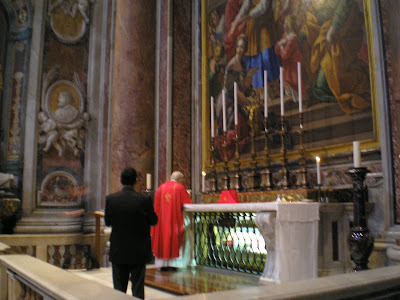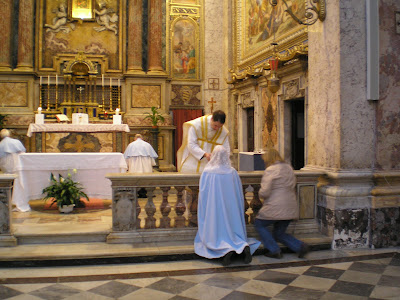From his Apostolic Constitution
Indulgentiarum Doctrina of Pope Paul VI on the Doctrine of Indulgences, issued on 1st January, 1967:
1. The doctrine and practice of indulgences which have been in force for many centuries in the Catholic Church have a solid foundation in divine revelation1 which comes from the Apostles and "develops in the Church with the help of the Holy Spirit," while "as the centuries succeed one another the Church constantly moves forward toward the fullness of divine truth until the words of God reach their complete fulfillment in her."
For an exact understanding of this doctrine and of its beneficial use it is necessary, however, to remember truths which the entire Church illumined by the Word of God has always believed and which the bishops, the successors of the Apostles, and first and foremost among them the Roman Pontiffs, the successors of Peter, have taught by means of pastoral practice as well as doctrinal documents throughout the course of centuries to this day.
2. It is a divinely revealed truth that sins bring punishments inflicted by God's sanctity and justice. These must be expiated either on this earth through the sorrows, miseries and calamities of this life and above all through death, or else in the life beyond through fire and torments or "purifying" punishments. Therefore it has always been the conviction of the faithful that the paths of evil are fraught with many stumbling blocks and bring adversities, bitterness and harm to those who follow them.
These punishments are imposed by the just and merciful judgment of God for the purification of souls, the defense of the sanctity of the moral order and the restoration of the glory of God to its full majesty. Every sin in fact causes a perturbation in the universal order established by God in His ineffable wisdom and infinite charity, and the destruction of immense values with respect to the sinner himself and to the human community. Christians throughout history have always regarded sin not only as a transgression of divine law but also -- though not always in a direct and evident way - as contempt for or disregard of the friendship between God and man,6 just as they have regarded it as a real and unfathomable offense against God and indeed an ungrateful rejection of the love of God shown us through Jesus Christ, who called His disciples friends and not servants.
3. It is therefore necessary for the full remission and - as it is called - reparation of sins not only that friendship with God be reestablished by a sincere conversion of the mind and amends made for the offense against His wisdom and goodness, but also that all the personal as well as social values and those of the universal order itself, which have been diminished or destroyed by sin, be fully reintegrated whether through voluntary reparation which will involve punishment or through acceptance of the punishments established by the just and most holy wisdom of God, from which there will shine forth throughout the world the sanctity and the splendor of His glory. The very existence and the gravity of the punishment enable us to understand the foolishness and malice of sin and its harmful consequences.
That punishment or the vestiges of sin may remain to be expiated or cleansed and that they in fact frequently do even after the remission of guilt is clearly demonstrated by the doctrine on purgatory. In purgatory, in fact, the souls of those "who died in the charity of God and truly repentant, but before satisfying with worthy fruits of penance for sins committed and for omissions" are cleansed after death with purgatorial punishments. This is also clearly evidenced in the liturgical prayers with which the Christian community admitted to Holy Communion has addressed God since most ancient times: "that we, who are justly subjected to afflictions because of our sins, may be mercifully set free from them for the glory of thy name."
For all men who walk this earth daily commit at least venial sins; thus all need the mercy of God to be set free from the penal consequences of sin.
4. There reigns among men, by the hidden and benign mystery of the divine will, a supernatural solidarity whereby the sin of one harms the others just as the holiness of one also benefits the others.12 Thus the Christian faithful give each other mutual aid to attain their supernatural aim. A testimony of this solidarity is manifested in Adam himself, whose sin is passed on through propagation to all men. But of this supernatural solidarity the greatest and most perfect principle, foundation and example is Christ Himself to communion with Whom God has called us.
5. Indeed Christ "committed no sin," "suffered for us," "was wounded for our iniquities, bruised for our sins . . . by His bruises we are healed."
Following in the footsteps of Christ, the Christian faithful have always endeavored to help one another on the path leading to the heavenly Father through prayer, the exchange of spiritual goods and penitential expiation. The more they have been immersed in the fervor of charity, the more they have imitated Christ in His sufferings, carrying their crosses in expiation for their own sins and those of others, certain that they could help their brothers to obtain salvation from God the Father of mercies. This is the very ancient dogma of the Communion of the Saints, whereby the life of each individual son of God in Christ and through Christ is joined by a wonderful link to the life of all his other Christian brothers in the supernatural unity of the Mystical Body of Christ till, as it were, a single mystical person is formed.
Thus is explained the "treasury of the Church" which should certainly not be imagined as the sum total of material goods accumulated in the course of the centuries, but the infinite and inexhaustible value the expiation and the merits of Christ Our Lord have before God, offered as they were so that all of mankind could be set free from sin and attain communion with the Father. It is Christ the Redeemer Himself in whom the satisfactions and merits of His redemption exist and find their force. This treasury also includes the truly immense, unfathomable and ever pristine value before God of the prayers and good works of the Blessed Virgin Mary and all the saints, who following in the footsteps of Christ the Lord and by His grace have sanctified their lives and fulfilled the mission entrusted to them by the Father. Thus while attaining their own salvation, they have also cooperated in the salvation of their brothers in the unity of the Mystical Body.
"For all who are in Christ, having His spirit, form one Church and cleave together in Him" (Eph. 4:16). Therefore the union of the wayfarers with the brethren who have gone to sleep in the peace of Christ is not in the least weakened or interrupted, but on the contrary, according to the perpetual faith of the Church, is strengthened by a communication of spiritual goods. For by reason of the fact that those in heaven are more closely united with Christ, they establish the whole Church more firmly in holiness, lend nobility to the worship which the Church offers to God here on earth and in many ways contribute to building it up evermore (I Cor. 12: 12-27). For after they have been received into their heavenly home and are present to the Lord (11 Cor. 5:8), through Him and with Him and in Him they do not cease to intervene with the Father for us, showing forth the merits which they have won on earth through the one Mediator between God and man, Jesus Christ (I Tim. 2:5), by serving God in all things and filling up in their flesh those things which are lacking of the sufferings of Christ for His Body which is the Church (Col. 1:24). Thus by their brotherly interest our weakness is greatly strengthened.
For this reason there certainly exists between the faithful who have already reached their heavenly home, those who are expiating their sins in purgatory and those who are still pilgrims on earth a perennial link of charity and an abundant exchange of all the goods by which, with the expiation of all the sins of the entire Mystical Body, divine justice is placated. God's mercy is thus led to forgiveness, so that sincerely repentant sinners may participate as soon as possible in the full enjoyment of the benefits of the family of God.
6. The Church, aware of these truths ever since its origins, formulated and undertook various ways of applying the fruits of the Lord's redemption to the individual faithful and of leading them to cooperate in the salvation of their brothers, so that the entire body of the Church might be prepared in justice and sanctity for the complete realization of the kingdom of God, when He will be all things to all men.















































































